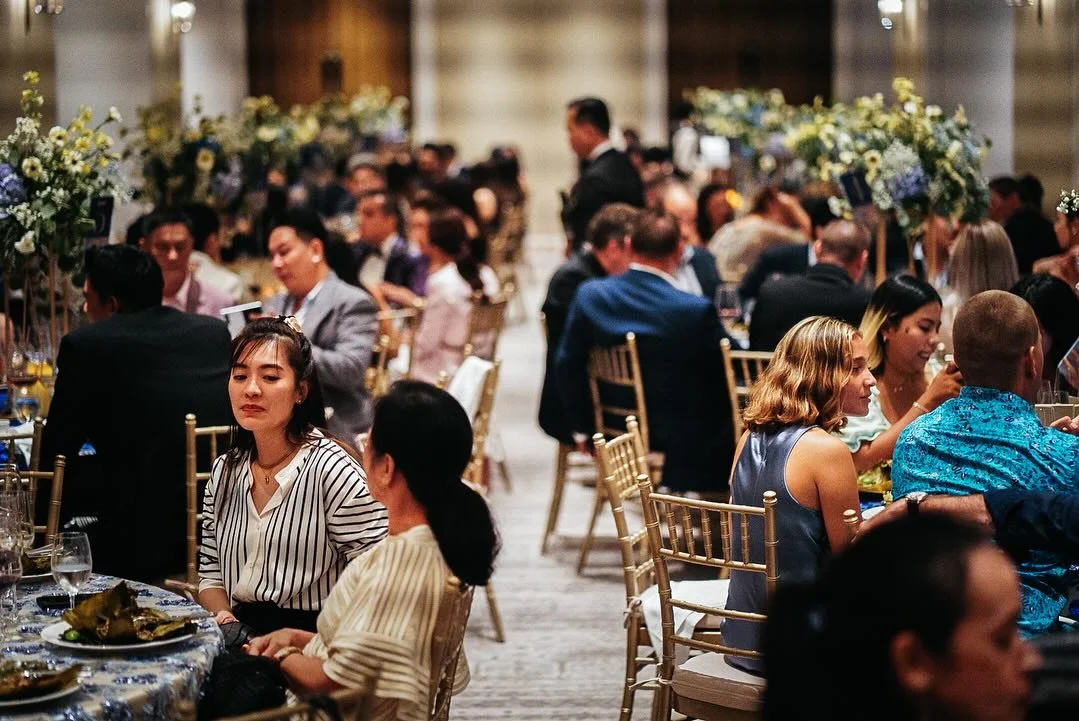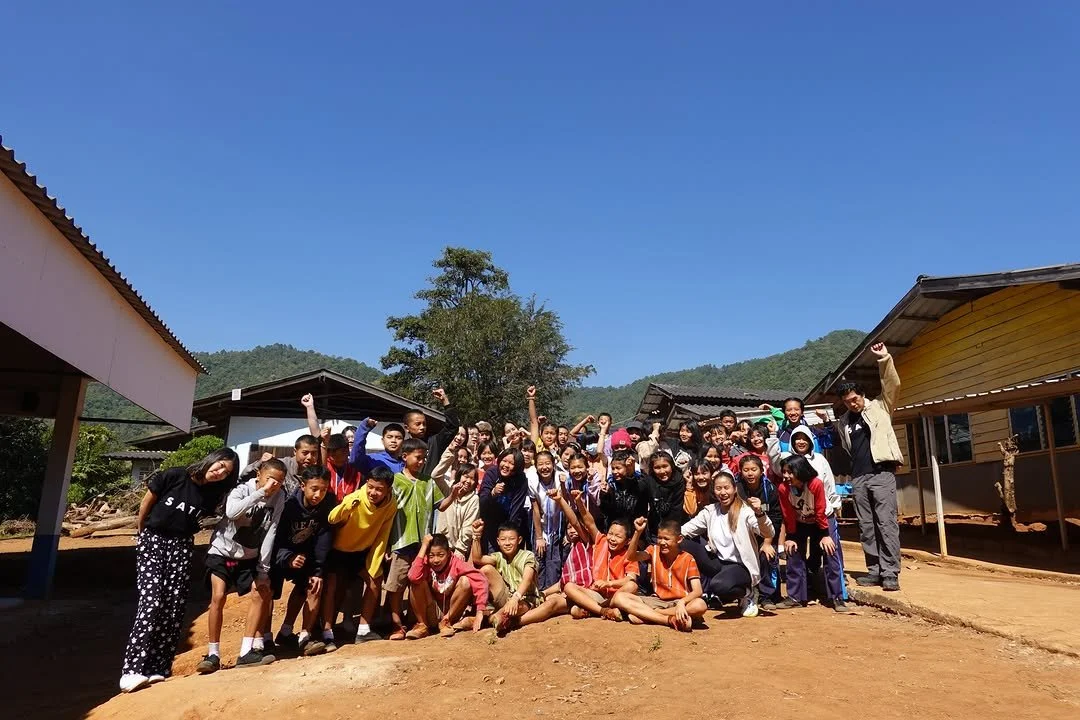Dishing the dirt Ep. 3 with Sakson Rouypirom
A conversation on Staying Human: Where Kindness meets Action.
In this next installment of the Dishing the Dirt series, we’re joined by Sakson Rouypirom—founder of Sati Foundation, Broccoli Revolution, and Na Projects—just a few among the many impactful initiatives he’s been leading. As a prominent figure in the social impact sector in Thailand, Saks tackles multiple dimensions via his social enterprises to make Thailand and Asia a Suai (สวย beautiful) place to be. Alongside our executive director, Peggy Chan, the discussion delves into the power of empathy and kindness that the hospitality industry can embrace to make long-lasting positive change.
Under Saks’ leadership, the SATI Foundation empowers at-risk and underserved youth through mental health support and sex education. Through Na Projects, he uses food as a medium for storytelling, fostering cultural understanding and supporting refugees and marginalized communities. His plant-based restaurant, Broccoli Revolution, champions healthy, sustainable eating in Thailand. Most recently, Saks and his partners organized a series of events—including a gala—that raised over 1.9 million baht for earthquake-affected communities in Myanmar, bringing together the hospitality sector in a powerful act of solidarity and compassion.
Let’s take a look at what they discussed!
The Complexity of Giving
“Giving is easy, delivery is tough, but sustaining is even harder,” reflects Saks when discussing his recent fundraising campaign for Myanmar. While people are eager to help during crises - often through monetary donations - ensuring that funds reach the right hands and are used effectively remains a major challenge. These concerns about transparency and long-term impact are ones Saks grapples with firsthand, highlighting the complexities of turning goodwill into lasting, meaningful support.
Source: @handinhandbkk
eyond delivering funds, Saks has learned that success isn’t always guaranteed. At the Sati Foundation, programs aim to empower at-risk youth with skills to break free from difficult circumstances. However, systemic barriers—such as family responsibilities, health issues, and past trauma—often lead 9 out of 10 participants to relapse into old patterns like substance abuse or sex work. Re-engaging them becomes part of a recurring cycle, revealing the deep-rooted complexity of creating lasting change in vulnerable communities.
One-off donations are often described as a band-aid solution, insufficient for creating long-lasting impact or systemic change. True transformation requires ongoing global pressure, awareness, and collective action to address the root causes. At ZFPA, like other impact-driven organizations, our work extends beyond simply distributing funds. On top of providing the tools, materials, and know-how to help farmers and their communities build self-resilience, our approach emphasizes co-developing projects, continuously reassessing them, and responding to evolving local needs and challenges. By actively addressing obstacles and integrating community feedback, we help ensure that both funding and knowledge contribute to meaningful, lasting impact.
Empathy in Action
Building on the complexity of giving, the conversation identified the foundation for success and empowerment - empathy. By putting yourself in someone else’s shoes and understanding how they feel, we might realize their stories are more intricate than imagined, and our “solution” might not encompass all their different levels of struggle.
“I think when we work in the impact sector, people tend to block things up or segregate them like poverty, equality, and the environment. But from my experience of over 10 years working in impact, everything is connected.”
Growing up volunteering in a hospital’s HIV youth ward, Sakson was deeply moved by the suffering he witnessed - an experience that instilled in him a lasting commitment to help others. His story underscores a vital truth: empathy and compassion are powerful drivers of impact. By acknowledging people’s feelings, we ease their burdens, foster mutual trust, and build deeper connections. True empowerment comes not just from financial aid, but from ongoing emotional support and solidarity, forming reciprocal relationships that enable lasting, meaningful change.
Source: @satifound
“I think kindness is such an overlooked trait now. It's like, how efficient are you, and how smart are you, and how rich you are, how talented you are… I don't really feel like talent without kindness is even important.”
Arming Farmers Resiliency
A detour in Saks’ journey led him to confront the broken and unjust supply chain systems harming both people and the planet. Through his work with Northern Thai tribes via the Sati Foundation, he witnessed firsthand the devastation caused by flash floods—a growing consequence of climate change and industrial farming. In 2023, entire villages suffered from these impacts. Yet, Saks noticed that some areas were spared. The difference? These communities weren’t growing monoculture corn for Big Agriculture. This realization underscored the urgent need to rethink our supply chains and build resilience through diversified, community-led, regenerative practices.
“So it was very clear that certain villagers who were doing rotational crops, they're doing like growing within the forest, doing under shade, growing it. They weren't getting flash floods. Then you go to the villages where it's like a single corn cover. They're getting classrooms flooded all over. So that for me was like an eye-opening situation where there's not only climate change, there's capitalistic food conglomerates that are just destroying the environment as well.”
As Saks pointed out, food is deeply political, influenced not just by demand but by powerful governmental and corporate forces. That’s why ZFPA champions the regenerative movement across Asia, where smallholder farms are especially vulnerable to climate change and lack leverage against large agribusinesses. Our nature-based approach helps farmers grow resilient crops, restore food sovereignty, and rebuild equitable supply chains. By demonstrating the success of climate-smart practices, we aim to inspire broader public demand for regenerative goods and prove that sustainable farming is not only possible—it’s essential for our future food security.
Source: @saks_r
Social Enterprise Model for Restaurants
Sakson’s work operates through multiple interconnected arms, tackling social and environmental issues from various angles while building a supportive ecosystem to improve project success. Whether through youth empowerment programs or using food as a storytelling medium, his initiatives create platforms for underrepresented and marginalized voices. Importantly, they also invite consumer participation, turning everyday actions—like dining or donating—into meaningful contributions that drive visibility, equity, and long-term impact.
Source: @naprojectsgroup (middle and right)
When asked if this model could represent the future of the hospitality industry, he responded candidly: “I wish it was the future, but the way things are going now, it doesn’t look that way to me. That does sound a bit depressing, but yeah.” (a reflection shaped by the aftermath of COVID).
Like many working in the impact space, Saks balances optimism with realism and a deep sense of empathy for the current landscape. Still, he stands as a powerful example of how restaurants can go far beyond just serving great food. Hopefully, in the near future, more restaurants, hotels, and businesses will use their platforms to drive meaningful change and advocate for positive impact.
Final Thoughts
Through every story shared—even when expressing frustration over the slow pace of change - Saks consistently leads with empathy and understanding. He takes the time to step into others’ shoes, seeking to understand the reasons behind resistance or hesitation. His thoughtfulness is a powerful reminder that real change requires not only action, but compassion. It's a quality that fosters deeper connection and paves the way for a more harmonious and inclusive society - an inspiring trait for anyone striving to create impact.
Thank you Sakson for joining us. Incredible to hear your journey and work in the impact space, and how we can grow together with a bit more kindness.









